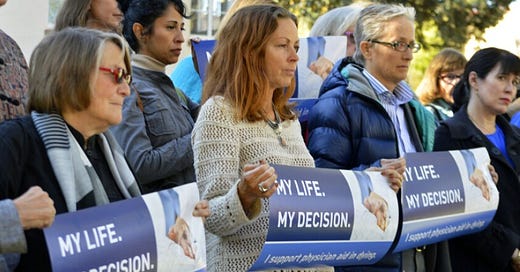Some economics of assisted dying
Economics provides a useful framework for thinking about the issue, and not only related to its monetary aspects.
Daniel Karsai, an accomplished Hungarian constitutional lawyer and attorney is currently a participant in legal action against Hungary before the European Court of Human Rights over the right to end one’s live through assisted suicide. Karsai suffers from advanced stage ALS, with essentially no hope for a cure. The case provides me with an excuse to bring up the economics of assisted suicide. Crucially, by economics I do not mean merely financial considerations, rather, I mean a framework based on cost-benefit reasoning and the assumption that individuals “maximize”.
The economic approach to suicide holds that individuals commit suicide if and only if they think they will be better off dead than living. David Hume, the first modern thinker who approached suicide from a broadly rational choice perspective stated that “no man ever threw away life, while it was worth keeping.” Suicide thus, can be “rational” in an economic sense; the individual ends live whenever her net expected lifetime utility is negative.
Of course, even economically rational suicide may not be rational is the everyday sense. Suppose, for instance, that someone suffers from intense emotional pain, due to a serious mental illness, which makes her life at the moment a net negative. Is life worth living for such a person? The difficulty in answering such a question lies in the nature of mental illness. Clearly, mental illness can turn one’s life into hell, but the patient and her doctors can rarely be confident about whether and when, if ever, her suffering will end or subdue, and her life becomes (perhaps much) better. This uncertainty may provide a good (but perhaps not conclusive) reason not to allow assisted suicide in case of mental illnesses.
The same reasoning breaks down, however, when applied to terminal (physical) illness. Consider late-stage cancer or ALS. Patients suffering from these diseases face an extremely small (or even zero) probability of living longer than a few weeks, months, or at best, years. They can also know a lot about their prospective quality of life in their remaining time, as well as the cost of their healthcare. Uncertainty is thus much less of an issue in these cases. In essence, terminal patients can determine more easily whether the life they are left with is worth living. Economics as a discipline is traditionally non-paternalistic, in that we tend to believe individuals know what’s best for them better than do outside observers, especially governments. As far as we have our own concept of “human dignity”, it is that each person can be a “rational actor”, whose choices should rarely be second-guessed by government officials. This is because individuals are the ones who have to live with the consequences of their decisions, and also because most people care about themselves more then how much outsiders (except for maybe one’s parents) care for them. We also tend to believe that making our own choices and living with the consequences improves our decision-making. In the case of assisted suicide, this latter aspect is less aplicable, given that, provided there is no re-incarnation, we do not learn from our very last choices. Still, the general anti-paternalistic stance seems applicable at least in the case of mentally competent terminal patients.
Individuals tend to choose best when they bear the consequences, both good and band, of their actions. This general principle is compromised in heavily socialized healthcare systems. Under single-payer systems, as healthcare is not allocated via the price system, healthcare providers must apply non-price rationing. In essence, decision-makers have to choose who lives and dies based on “need”, life prospects, and, of course, the monetary cost of care. Many opponents of assisted suicide are concerned that this property of many contemporary health delivery systems biases these systems in the direction of not only allowing assisted dying, but also trying to persuade more patients to take that route even in cases where the patients or their families would be willing to pay a lot to continue the patient’s life. This might be because the cost of care for terminal patients largely falls on the taxpayers, and thus those representing “the public” might pressure patients to choose to die earlier, saving the public a lot of money. Other euthanasia opponents claim that the option of assistent suicide discourages the provision of financial and other resources to those in need. These are, I believe, valid points, but may or may not be enough to overturn the anti-paternalistic presumption. In any case, largely privatized health delivery systems might be more suitable for accomodating assisted dying than socialized ones.
The issue of assisted dying brings up a number of issues that are relevant from an economic perspective. Economics often takes a non-paternalistic perspective in relation to individual choice. I believe we have a justified presumpton in favour of free choice and individual responsibility, and this applies to assisted suicide as well. The presumption may be overturned in cases where individual responsibility is compromised (such as in socialized healthcare systems), or when there is “too much” uncertainty about what the future brings. Still, I believe the presumption is a useful starting point when discussing the issue from an economic perspective. Finally, the economic perspective might help reasoning through the situation even if the decision of whether to allow assisted dying depends on other considerations as well.




I’m not sure it’s true that “largely privatized health delivery systems might be more suitable for accomodating assisted dying than socialized ones”. That may have been true in years past, when insurers were less activist in their efforts to avoid paying for things; but in today’s marketplace, insurers have mastered the dark art of delay and deny. At least in a socialized system, there could (emphasis on “could”) be a citizen panel for oversight. Private insurer oversight is from accountants and “medical directors”.